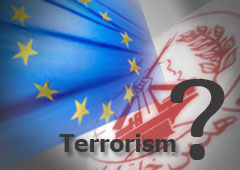The destiny of those in TTL lies in the hands of those who de-proscribed MKO
Following an order by the European Court of Justice on December 4, 2008, the European Union  removed Mojahedin Khalq Organization MKO from its terror list on 27 January 2009. In fact, the court agreed with MKO that the EU did not give sufficient reasons for including the group on the terrorist list, and it ordered the EU to remove the group. At the time, Jesus Carmona, a spokesman for the Council of the European Union, said that: “The court did not enter into the question of defining or not MKO as a terrorist organization. The only thing that the court decided … was that procedures were not respected.”
removed Mojahedin Khalq Organization MKO from its terror list on 27 January 2009. In fact, the court agreed with MKO that the EU did not give sufficient reasons for including the group on the terrorist list, and it ordered the EU to remove the group. At the time, Jesus Carmona, a spokesman for the Council of the European Union, said that: “The court did not enter into the question of defining or not MKO as a terrorist organization. The only thing that the court decided … was that procedures were not respected.”
Was it really for respecting the court’s ruling or for other political and apolitical reasons, the EU immediately removed MKO from its terrorist list. But many were of the opinion that the EU’s questionable decision to take the group off the list was tantamount to encouraging terrorism and criticized the move because it would create an opportunity for terrorists in Europe to commit terrorist acts against European citizens. However, neither at that time nor at the present has the group provided convincing evidences that it has denounced terrorism in any form.
Beside its de-proscription, MKO enjoys a big bulk of supporters and advocates among a variety of European institutions and parliaments. But the challenge it is facing at the moment, when it needs all these advantages more than any time, is that none of the EU country members have so far agreed to receive the expelled members of the group as the refugees on their soil. Their meaningful silence is an indication of the fact that to delist a terrorist group for any political cause is one thing and to let it on their soil with all its threats and terrorist potentialities still in question is something else. None is still convinced that MKO can be trusted on the claims of having denounced terrorism.
Once Alejo Vidal-Quadras, an European advocate of MKO, just in the celebration of group’s removal from the EU list stated that “After the removal of the PMOI from the blacklist, any violation of the rights of Ashraf residents is unacceptable, and we will not accept it. Abusing Ashraf is an abuse of democracy, an abuse of the sacred right of asylum, an abuse of international law, and an abuse of humanitarian values. We will confront all such violations”. Were these words put into his mouth by MKO or was he really anxious about the condition of Ashraf residents? Now more than 3000 expelled residents, most of them victims of the terrorist cult, are waiting in Iraq with uncertainty. And the EU countries as the defenders of human rights have a responsibility to fulfill. If these residents are terrorists, why these same European countries have delisted them? And if they are human beings whom they believe their rights have been violated, then, why are they turning a blind eye to the victims of the modern slavery?
The EU foreign policy towards MKO seems to be more or less like that of the United States. Despite America’s promises of removing the group from its terror list and lobbying efforts to transfer the residents to third countries, neither the US itself nor any of its allies have so far shown a willingness to receive members on their soil. It is also the same with the UN Members States. The words of Martin Kobler, special representative of the Secretary-General in his briefing to the Security Council well expresses how concerned he is about the epidemic unwillingness to accept residents waiting at temporary Transit Location TTL to be processed as refugees: “I reiterate my call to Members States to accept the residents of the Camp in their countries. Now that UNHCR has begun its work, it is high time for the international community to accept eligible candidates and fund the relocation process. The support of the international community is urgently needed. … Without international support, the process cannot succeed.”
It is a proven fact that the Western countries and the US stand behind MKO and voice protection to demonstrate it as a bogy and leverage in their political battle and disputes with Iranian regime. MKO has been a problem more for these countries than for Iranian regime; one day they proscribe it a terrorist group and the next day they remove or threaten to delist it. The real victims are the members; for long they have been the slaves of the terrorist cult played as a puppet in the hands of Western countries and wandering in a variety of countries and in Iraq. Their destinies as humans with a right to live free lie in the hands of those who de-proscribed them. We are waiting to see if political businessmen and investors really believe in their slogans of defending human rights to end the agonies of these suffering victims and come to their help.

